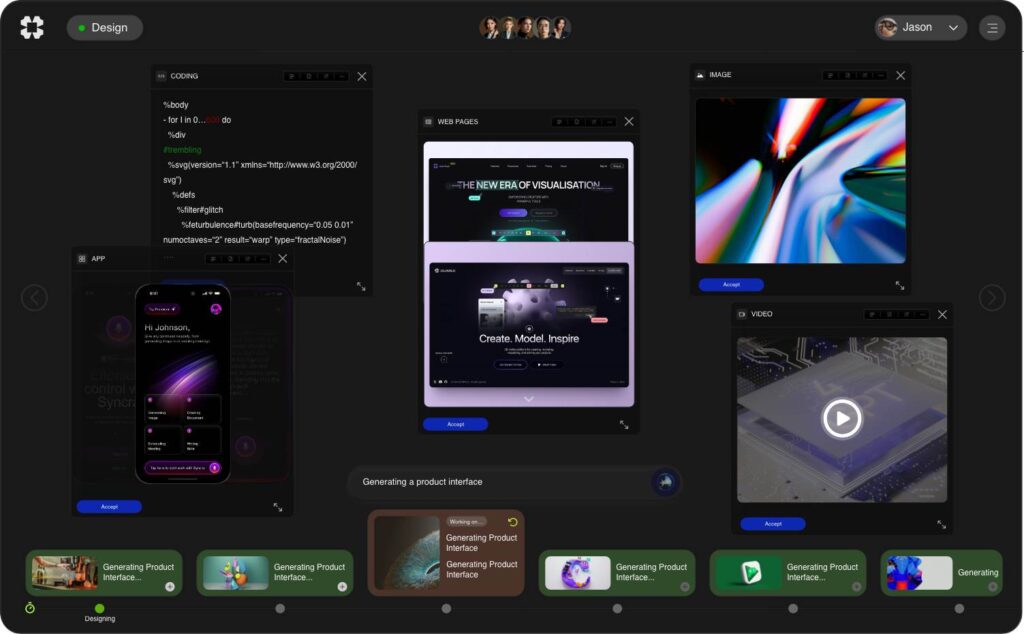Artificial Intelligence (AI) is no longer a futuristic idea; it has already begun to reshape industries across the globe. From workflow management to personalization strategies, and the overall digital transformation of businesses, AI is at the forefront of innovation. This article will delve into the latest trends, powerful solutions, and real-world industry applications, highlighting the profound impact AI has on today’s commercial landscape.
.
**The Rise of AI Workflow Management**
AI workflow management is transforming how organizations operate by optimizing processes through automation and intelligent decision-making. By integrating AI technologies into workflow management systems, businesses can achieve unprecedented levels of efficiency and coordination. Companies are harnessing AI to streamline processes, reduce costs, and improve service delivery.
.
AI workflow management tools use algorithms that analyze workflow patterns and employee performance. They can predict bottlenecks, suggest optimal resource allocation, and automate routine tasks, freeing up employees to focus more on strategic initiatives. For instance, UiPath, a leading robotic process automation (RPA) platform, utilizes AI to enhance digital workflows, enabling organizations to respond to market changes swiftly and effectively.
.
Furthermore, these AI-driven solutions harness data analytics to identify trends and adapt processes in real-time. For example, Salesforce has incorporated AI into its customer relationship management (CRM) tools, allowing companies to gain insights into customer behaviors and preferences. By leveraging AI-powered workflow management, organizations are not just improving efficiency; they are also fostering better collaboration and communication among departments.
.
**AI-Powered Personalization: Tailoring Experiences**
In an age where consumers crave customization and meaningful interactions, AI-powered personalization has emerged as a game-changer in marketing and service delivery. Businesses are turning to AI to analyze vast amounts of data collected from customers—such as purchase history, online behavior, and demographic details—to create personalized experiences that resonate.
.
According to a study by McKinsey, companies that excel in personalization can generate 40% more revenue from those activities than non-personalized counterparts. AI algorithms can segment audiences based on specific attributes and predict the products or services that individual customers might prefer. This level of granularity enables businesses to craft targeted marketing campaigns that yield higher engagement rates.
.
E-commerce giants like Amazon have exemplified the power of AI in personalization. By analyzing user behavior and preferences, Amazon personalizes recommendations, making compelling suggestions that often lead to additional purchases. As consumers receive tailored experiences, their loyalty and satisfaction are propelled, indicating that personalization through AI is not merely a trend but a crucial strategy for business success.
.
Moreover, AI’s ability to learn and adjust means that personalization is continually evolving. Tools analyze feedback and interactions, fine-tuning the recommendations for future engagements. The more a consumer interacts with a brand, the better the AI becomes at understanding their preferences, making the user experience richer and more satisfying.
.
**AI in Digital Transformation: Empowering Businesses**
Digital transformation refers to the integration of digital technology into all areas of a business, fundamentally changing how organizations operate and deliver value to customers. AI plays a pivotal role in this transformation, enabling businesses to rethink and redesign processes for better performance and adaptability.
.
For instance, manufacturing firms are increasingly leveraging AI-driven solutions to enhance production, optimize supply chains, and improve quality control. Advanced machine learning algorithms analyze vast datasets collected from sensors on the machinery, predicting maintenance needs before issues arise. This predictive maintenance significantly reduces downtime and keeps production lines running smoothly.
.
In the banking and finance sector, AI is streamlining operations and enhancing customer service through chatbots and AI-driven analytics tools. Financial institutions are using AI algorithms to detect fraudulent activities swiftly, allowing them to respond more effectively than traditional methods. These applications highlight AI’s capability to transform not only operational efficiency but also risk management in heavily regulated industries.
.
Moreover, healthcare organizations are leveraging AI to facilitate patient care and operational efficiency. AI algorithms analyze patient data to predict treatment outcomes, optimize resource allocation, and enhance diagnostic accuracy. Companies like Zebra Medical Vision apply AI to medical imaging, helping radiologists to detect conditions faster and with greater accuracy.
.
**Bridging the Gap: AI in Workflow Management, Personalization, and Digital Transformation**
Integrating AI into workflow management, personalization, and digital transformation is not just about technology; it’s about reshaping corporate culture to embrace innovative solutions. It requires cross-departmental collaboration, ongoing education, and training for employees to adapt to new technologies.
.
To successfully implement AI, organizations need to establish a clear strategy that aligns with business goals. Leadership must foster an environment that encourages experimentation and openness to change. Companies that treat AI as a partner rather than a replacement for human resources will likely see more sustainable success.
.
Additionally, data privacy remains a hot-button issue, especially regarding AI-driven personalization. Companies must prioritize transparency and comply with regulations like GDPR to establish trust with customers. Balancing personalization with privacy will be crucial for organizations as they navigate this new landscape.
.
**Conclusion: The Road Ahead**
AI’s influence on workflow management, personalization, and digital transformation signifies a paradigm shift that is already unfolding across numerous industries. The way organizations adopt and integrate these technologies will determine their competitive edge in the future marketplace.
.
As companies continue to harness the power of AI, they must remain vigilant about evolving technologies and consumer expectations. Building robust frameworks that support innovation and workforce development will ensure long-term viability and success.
.
In a world that increasingly relies on data, learning, and adaptation, those who embrace AI with foresight and responsibility will lead their industries into a promising future defined by efficiency, personalization, and transformative growth.
.
**Sources:**
– McKinsey & Company. “The Rediscovery of Personalization.”
– UiPath Reports on RPA Automation Trends.
– Salesforce AI Features Overview.
– Amazon’s Personalization Algorithms: A Case Study.
– Zebra Medical Vision Insights on AI and Radiology.
– Industry Studies on Digital Transformation in Banking.
This comprehensive investigation into AI technologies illustrates that the future is bright for organizations willing to innovate and adapt to the newfound roles AI presents across workflow management, personalization, and digital transformation.




















